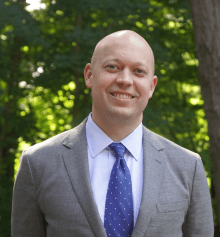Q & A with Aaron Houck

written by Janice Mukhia
Dr. Aaron Houck moved with his family to Charlotte from West Virginia when he was eight years old. He grew up in the University City area, which like the University, has changed a lot. Dr. Houck attended Charlotte-Mecklenburg Schools and graduated from Independence High School with an IB diploma. He earned his undergraduate degree from Davidson College, law degree from Harvard Law School, and a Ph.D. (in political science) from Duke University. Dr. Houck was an Associate Professor in the Political Science Department at Queens University of Charlotte before joining UNC Charlotte. He lives with his wife and two kids in the Elizabeth neighborhood.
What is your role at the Urban Institute and how long have you served in this position?
I am the Director of Regional Policy at the Urban Institute at UNC Charlotte, a division of urbanCORE, UNC Charlotte’s hub for engaged scholarship system. I have served in this role since June 2022. Prior to that, I worked at the Urban Institute from 2007 to 2009, before I got my Ph.D.
What are your main research areas?
I am interested in local policy and policymaking. Local and regional governments have significant influence over jobs, housing, transportation, and education, so I am interested in what research suggests are the most effective policies for managing the challenges and opportunities associated with those issues. But I am also very interested in understanding the process policymaking itself. After all, I am a political scientist, and political science is the study of the pursuit, acquisition, and exercise of power–particularly the power to establish laws, rules, institutions, and norms governing collective action and the provision of public goods.
What interests you about the work you do at the Urban Institute?
My work at the Urban Institute requires me to serve as a bridge between the community and the University (and academia more broadly). When I work with community stakeholders, I learn about their experiences and perceptions of challenges and opportunities. When I work with University partners, I learn about the latest scholarship. In exchange, I share the lessons of research to the community to help us solve important problems, and bring local knowledge and concerns to researchers to identify new research topics.
How does the work you do at the Urban Institute impact the community and UNC Charlotte’s mission of “Shaping What’s Next”?
The Urban Institute has been around for over fifty years and serves as the region’s center for applied public policy research. The Urban Institute helps the Charlotte region understand complex phenomena and to connect and apply academic research to specific policy challenges. The Urban Institute plays an important role in helping the region pursue its goal of progress toward ongoing economic growth that is equitable and sustainable.